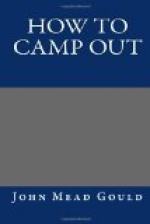Drinking ice-water offers a somewhat parallel case; even on stopping to drink at the brook, when flushed with heat, it is well to bathe the face and hands first, and to taste the water before a full draught. It is a well-known excellent rule, not to bathe immediately after a full meal; because during digestion the organs concerned are comparatively engorged and any sudden disturbance of the circulation may be disastrous.
The imperative necessity of resisting drowsiness under extreme cold requires no comment.
In walking under a hot sun, the head may be sensibly protected by green leaves or grass in the hat; they may be advantageously moistened, but not enough to drip about the ears. Under such circumstances the slightest giddiness, dimness of sight, or confusion of ideas, should be taken as a warning of possible sunstroke, instantly demanding rest, and shelter if practicable.
HUNGER AND FATIGUE
are more closely related than they might seem to be: one is a sign that the fuel is out, and the other asks for it. Extreme fatigue, indeed, destroys appetite: this simply means temporary incapacity for digestion. But, even far short of this, food is more easily digested and better relished after a little preparation of the furnace. On coming home tired it is much better to make a leisurely and reasonably nice toilet, than to eat at once, or to lie still thinking how tired you are; after a change and a wash you feel like a “new man,” and go to the table in capital state. Whatever dietetic irregularities a high state of civilization may demand or render practicable, a normally healthy person is inconvenienced almost as soon as his regular mealtime passes without food; and few can work comfortably or profitably fasting over six or eight hours. Eat before starting; if for a day’s tramp, take a lunch; the most frugal meal will appease if it do not satisfy hunger, and so postpone its urgency. As a small scrap of practical wisdom, I would add, Keep the remnants of the lunch if there be any; for you cannot always be sure of getting in to supper.




